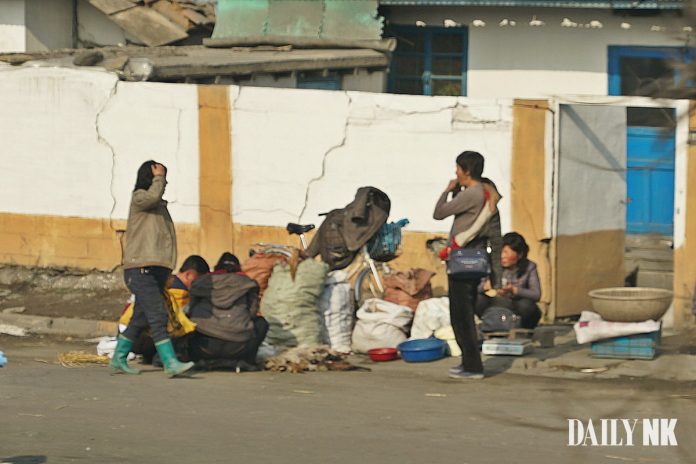
Early March rice prices in North Korea have hit their highest point ever compared to prices surveyed in early March over the past five years, a recent Daily NK survey of commodity prices in North Korea has found. The survey also found that rice prices are not falling by much following last year’s harvest, but demand is rising for corn, a rice alternative.
According to Daily NK’s regular survey of North Korean market prices, a kilogram of rice in Yanggang Province’s city of Hyesan cost KPW 6,300 as of Mar. 5. That is 3.3% higher than two weeks ago on Feb. 19, when it cost KPW 6,100.
In Hyesan, the price of a kilogram of rice rose to KPW 6,300 in late November and began falling from December to KWP 5,620, but has been rising once again since mid-January.
In fact, early March rice prices in North Korea were found to be the highest ever of all Daily NK surveys taken in early March over the past five years.
On Mar. 7 of last year, the price of rice in Pyongyang, Sinuiju and Hyesan was KPW 4,870, KWP 5,000 and KPW 5,200, respectively. The price of rice in early March of this year is about KPW 1,000 more expensive than last year.
In early March 2019, before North Korea shut its borders to prevent the spread of COVID-19, the price of rice in Pyongyang, Sinuiju and Hyesan was KPW 4,200, KWP 4,210 and KPW 4,400, respectively. In early March of this year, it was 38% more expensive in Pyongyang, 42% more expensive in Sinuiju and 30% more expensive in Hyesan.
The current rice prices are even higher than when rice and corn prices spiked following a spate of panic buying of grain after North Korea closed its border in January 2020.
In Pyongyang, however, the price of rice has fallen somewhat compared to Daily NK’s survey of prices taken in mid-February. A kilogram of rice in Pyongyang’s markets cost KPW 5,800 as of Mar. 5, 3.3% less than it cost on Feb. 19, when it cost KPW 6,000.
The fall in rice prices in Pyongyang suggests that the city’s residents may have been able to recently purchase grain through state-run food shops.
Choi Ji-young, a researcher at the Korea Institute for National Unification (KINU), said the regional discrepancies in rice prices “may be a reflection of the difference between regions where it’s difficult to buy rice and regions where it’s relatively easy due to [the operation of] state grain shops or changes in the internal distribution system following the start of the COVID-19 pandemic.”
In short, Choi suggests that price differences between regions are occurring due to the ways the authorities are managing and controlling the distribution of food.
CORN PRICES RISE AT A STEEPER RATE THAN RICE
Meanwhile, the price of corn in North Korean markets is rising more sharply than the price of rice.
As of Mar. 5, a kilogram of corn in the markets of Pyongyang, Sinuiju and Hyesan cost 6 to 11% more than it did in Daily NK’s survey in February.
A kilogram of corn cost KPW 3,000 in Pyongyang, 11% more than it did on Feb. 19, which essentially means that while demand for rice fell in Pyongyang, demand for corn skyrocketed.
In fact, the price of corn this year is at a five-year high for early March.
In early March of 2019, prior to the closure of the border, a kilogram of corn cost KPW 1,580 in Pyongyang, KPW 1,500 in Sinuiju and KPW 1,700 in Hyesan, but the current price has almost doubled compared to that time.
In regards to this trend, KINU’s Choi said the sharp climb in corn prices relative to rice is a signal that North Korea’s food situation “is not good.”
“Usually, grain prices remain stable through the first quarter and rise from the second or third quarter, but this year, grain prices are rising more rapidly than in previous years,” she said.
Translated by David Black. Edited by Robert Lauler.
Daily NK works with a network of reporting partners who live inside North Korea. Their identities remain anonymous due to security concerns. More information about Daily NK’s reporting partner network and information gathering activities can be found on our FAQ page here.
Please direct any comments or questions about this article to dailynkenglish@uni-media.net.

















